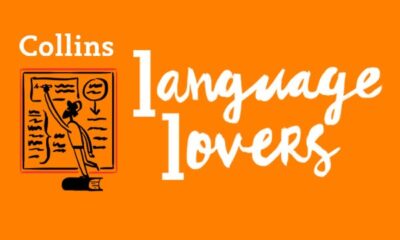Word-lovers abound in the Collins Dictionary community, and so we’re running an interview series with some of the ones we’re lucky enough to count as friends of the blog.
We’re delighted to speak to Nic Subtirelu, who runs Linguistic Pulse and is interested in the areas of Sociolinguistics and Discourse Analysis.
You can read Nic’s blog at www.linguisticpulse.com and follow him on Twitter at @linguisticpulse.
What is your favourite language?
I would have to say English but not because I’ve made some principled decision among all of the world’s languages. English is the language of my professional life, my closest personal relationships, and my inner thoughts.
However, the objectively best language in the world is ǃXóõ, which is estimated to have the largest number of distinct sounds (phonemes) of any language currently in existence and thus obviously must be the best.
What is your favourite word?
I like the word resonance. It refers to a concept in the physical world I find appealing, like the subtle vibrating against your hands and body generated by an acoustic guitar. Its metaphoric use is also quite appealing to me, the idea that certain ideas resonate with us or appeal to us because of some experience or perspective we have. It’s an interesting way of pointing out that we may experience things differently because of our pasts and this may lead us to like or dislike them. Plus, it sounds pretty — resonance.
What is your favourite non-mother tongue word?
I have a lot of positive memories of Arabic insha’Allah, which roughly translates to something like “Allah willing”. I’ve taught and worked with a lot of Arabic speakers and speakers of other languages that also use this term. In my experience, Arabic speakers frequently borrow the term into English and use it in contexts where hopefully would also be appropriate, and this results in occasional instances of cultural and linguistic sharing with an Arabic speaker explaining the meaning and significance of the word to someone who is unfamiliar with it. I’ve heard many others, influenced by their frequent interactions with Arabic speakers, borrow the term themselves. Cue “It’s a small world after all”.
Who is your favourite author or poet?
I’ve been really into Ta-Nehisi Coates for the past year or so. I was especially impressed by Coates’ musings on the privilege of being an English speaker as he was trying to learn French in France, which he compared to other systems of power and privilege, like Whiteness in the United States. He combines insightful social commentary with a beautiful, moving writing style. My recommendation of him will never really do his work justice, so just go read him.
What is your favourite line from a poem, quote, lyric or motto?
“This too shall pass.” Besides the fact that I find this phrase aesthetically pleasing, it has a fascinating back-story. Nowadays most people would use it as a comfort in times of pain. However, the Persian fable from which the phrase is supposed to have originated actually makes the point that events and circumstances in our lives are all ultimately merely temporary, and that, as a result, this statement is applicable in all times and places. Thus, when I’m feeling down, I try to remember that the feeling and the circumstances that have produced it will pass. At the same, I try to keep this mantra in mind during good times, because if I can maintain perspective on the impermanence of a situation, I feel I can more fully experience the moment.
When do you remember realising you loved words? Any early wordy memories?
I can’t really remember a time when I wasn’t interested in words and language. My father’s family is Romanian, and I remember being quite fascinated, if a little perplexed, by the idea that my father had grown up speaking a language, Romanian, that was entirely different than the one I spoke, English. I have some early memories of trying to sort this out through asking my parents the words for objects in other languages (usually Romanian) at the kitchen table as well as checking out books from the library on other languages.
However, I attribute my current level of language obsession to two things that occurred while I was in high school. First, I took my first foreign language class, German with Frau McPike, which was really important to me because it was one giant lesson in the fact that there were other ways of being in the world that were different from me and everyone around me and yet were equally valid, often even intriguing. I also read 1984 by George Orwell, which drew my attention to how language could be a tool for wielding power, how controlling what things were called or how they were talked about was a source of social, economic, and political power. Both of these themes are still central to my work today.
What do you wish for other people to experience, enjoy or get out of words?
If there’s any generalization I think we can safely make about language in the social world it’s that people already do enjoy and richly experience words, whether they attend to words as an object of study, as I do, or not. Words are already incredibly important to all of us. They can fill us with joy. They can comfort us when we’re hurt. Indeed, they’re often the very reason we’re hurt to begin with. We even sometimes use them to shape the very world we live in like when an officiant declares “I now pronounce you husband and wife” at a wedding.
If anything, I wish people would be more willing to acknowledge the effects words can have. I often hear people dismiss the need to carefully consider how we represent the world using words. For example, many people scoff at concerns about politically correct language, such as the appropriateness or offensiveness of labels we apply to groups of people. Given that the way we represent others has an impact on how we understand them and how they understand themselves, I think it’s important to think about such issues.
What is your most hated word or grammar mistake?
My least favorite language-related mistake is when people mistakenly use the term grammar mistake or grammar error when what they really mean is “a perfectly valid way of expressing oneself that triggers my irrational disdain most likely rooted in some form of prejudice which I will now proceed to rationalize through tortured logic and pseudoscience”. See, for example, every article ever written bemoaning hyperbolic use of the word literally.
Which other wordy bloggers or twitter users do you love?
There are many and hopefully you’ll get a chance to talk to all of them at some point. For the purpose of keeping this brief, I’ll just give one blog recommendation. I always enjoy reading Ingrid Piller and her colleagues’ contributions at Language on the Move. A really memorable piece at that blog is by Jinhyun Cho who explains the social class-based connotations of Gangnam style within the context of Korean society. That post really contextualized the popular song in a meaningful way for me.
What is your least favourite word?
I don’t really have a least favorite word per se. If anything I dislike the purposes for which some people use words. I’m not a fan of euphemisms that abstract away from or attempt to legitimize things like human suffering. For example, I object to the United States military’s use of the phrase collateral damage to refer to human death resulting from military actions. The phrase seems to imply that people’s deaths are only of secondary concern.
– – –
Thanks to Nic for answering our questions! We’d love to hear your thoughts on Nic’s interview – did you find any resonance in his answers? Who else you’d like to see us interview?




collins_dictionary_official
The home of living language. #wotd #wordlovers #collinsdictionary
Read our word of the week definitions and blog posts: